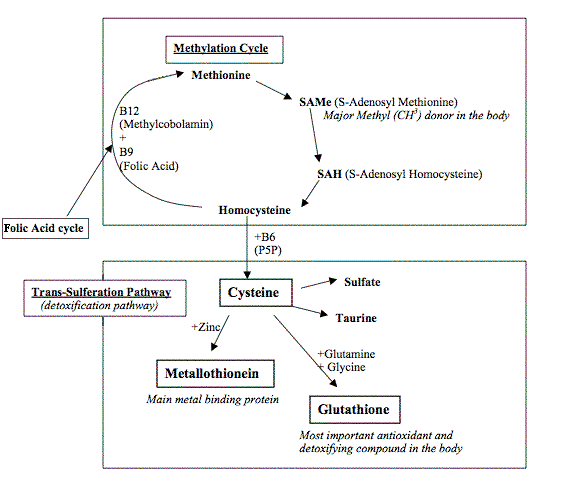Glutathione
The Master Antioxidant
Glutathione is a detoxification binding protein made in the Liver from N-Acetyl Cysteine and two other amino acid supplements:
- Glycine
- l-Glutamine
N-Acetyl Cysteine is of extreme importance because it contains within its chemical structure the Sulfur orSulfhydryl groups (thiols) which bind to:
- Mercury
- Chemical pollutants
- Pesticides
- UV radiation
- Acetominophin
- and many other dangerous carcinogens
The very best dietary source of N-Acetyl Cysteine is Organic pasture raised eggs. The sulfur amino acids which are found in high amounts in eggs are necessary for the production of Glutathione which is the body's primary defense against environmental pollutants, heavy metals, and toxins which the Liver has to detoxify out of the blood on a daily basis.
Cruciferous vegetables such as cauliflower, broccoli, Cabbage, brussel sprouts, Kale and collard greens are other very good sources of Methionine and Cysteine which are both Sulfur Amino acids that help in the production of Glutathione
Glutathione (GSH) binds to or conjugates with Mercury, Lead, Copper, free radicals, and other toxins because of the Sulfur containing N-Acetyl Cysteine which is the major component of Glutathione. These Glutathione bound-toxin complexes are either carried to the Liver to be excreted through the bile and intestines or to the Kidneys where the Glutathione complexes are excreted through the urine.
Glutathione is the principle detoxifying agent in the body and is the most powerful anti-oxidant to help prevent aging, protect against Cancer cells and Heavy Metal Toxicity.
The main component that is needed for the production of GSH is N-Acetyl Cysteine.
N-Acetyl Cyteine is an antioxidant sulfur containing amino acid supplement closely related to L-Cysteine, being its acetyl derivative. Cysteine is important for homeostasis, being a glutathione precursor, and a natural source of sulfur for metabolism. Yet L-Cysteine is unstable, and can become degraded while being absorbed. N-Acetyl Cysteine, on the other hand, is more stable than L-Cysteine and conveniently becomes converted into L-Cysteine after being absorbed. Thus NAC taken orally will raise blood and tissue cysteine levels. As a dietary supplement, NAC is therefore a highly attractive alternative to L-Cysteine. N-Acetyl Cysteine is also the precursor to the production of Taurine and Metallothionein. This makes Cysteine a very important high demand amino acid in all detoxification processes.
The best way to increase cellular Glutathione levels is by supplementing with N-Acetyl Cysteine, because Cysteine is the limiting component in the production of Glutathione. There is usually more than enough Glutamine and Glycine, but not enough Cysteine. Taking Glutathione supplements won't do any good since it is a protein and will be broken down in the stomach hydrochloric acid into its components glycine, glutamine, and cysteine. The small intestine is not designed to absorb whole proteins. Only amino acids, the building blocks of proteins should be allowed across the intestinal wall lining into the blood stream.

Glutathione and Taurine
When the body is overburdened by toxins such as Mercury, pesticides, VOC's, Reactive Oxygen Species (free radicals), or the chronic use of pain medications such as Vicodin and Tylenol (acetominophin conjugates with GSH, sulfate, and other sulfur amino acids (SAA's) so strongly that the Liver is completely stripped of GSH and other Sulfur containing binding proteins, which leads to Liver cirrhosis and hepatic failure), our Liver's stores of Glutathione becomes greatly depleted.
Glutathione is so important that it is found in every single cell to help protect the cell membrane from the dangerous effect of free radicals. Declining cellular GSH levels are a general marker for aging and degenerative diseases. Therefore, all of our N-acetyl Cysteine continues to get diverted into the production of Glutathione, leaving less and less left over for the production of Taurine.
Taurine is an extremely important sulfur containing amino acid which is used in large quantities by the heart to help regulate the heart beat. People low in Taurine can get heart arrhythmias, skipped beats, palpitations, and can be implicated in congestive heart failure.
Taurine is also a necessary component in the formation of Bile acids in the liver. Low amounts of Taurine can reduce biliary output, reducing our ability to emulsify fats and also reducing our Liver's ability to eliminate toxic waste products such as glutathione/toxin conjugations through the bile and out through the colon. This may also lead to gall bladder disease and increase the risk of gall stone production.
Finally, Taurine is also one of the main amino acid neurotransmitters used throughout the nervous system to inhibit our adrenal stress response and is therefore one of the most important inhibitory amino acids in our body, similar to Glycine, and Gamma-Aminobutyric Acid (GABA). Taurine is actually a required component in the conversion of glutamic acid into GABA which makes Taurine very effective at helping to reduce the occurrence of seizures due to too much Glutamic acid building up in the brain.
Glutamic acid opens the Calcium channels of the brain cells, allowing Calcium to enter the brain cell and cause neuronal death (apoptosis). GABA closes these calcium channels and thus inhibit the firing of the neuron, making GABA one of the strongest sedative neurotransmitters in the body. Taurine increases the production of GABA and is therefore also very relaxing and effective at treating anxiety, insomnia as well as helping to treat Adrenal fatigue by inhibiting the Adrenal stress response which keeps the adrenals overstimulated and over-reactionary. By inhibiting this stress response, Taurine can help make the Adrenal glands to rest deeply so that they may truly recover their strength. Being stimulated constantly causes the adrenal glands to become overworked and they get burned out.